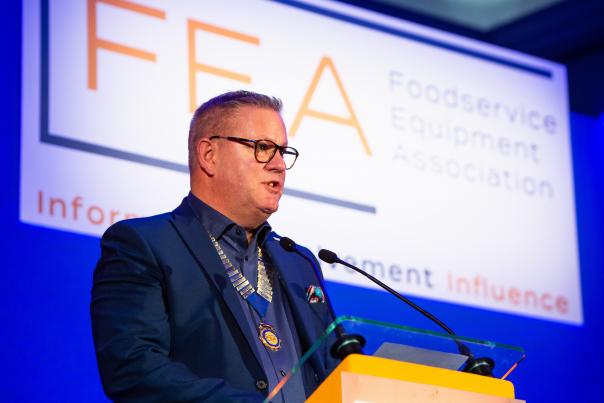
In the heart of England, industry leaders, innovators, and futurists converged at the Foodservice Equipment Association (FEA) Conference 2023 to address the challenges and opportunities shaping the foodservice and hospitality landscape.
Economic Insights: Peter Westaway’s Forecast - The conference opened with an economic outlook delivered by Peter Westaway, former Chief Economist of Vanguard Europe. He painted a stark picture of the global economy, still recovering from the 2007 financial crisis, compounded by the pandemic and war in Ukraine, resulting in stagflation—where inflation and economic growth dance on a tightrope.
The UK’s economic trajectory painted a sombre picture, with GDP growth stagnating and not expected to surpass 1% for at least a year. However, Westaway offered a glimmer of hope as inflation started to recede, primarily driven by a drop in food and fuel prices associated with the Ukraine war. He suggested that a potential drop in interest rates could boost consumer spending, providing a silver lining to the economic clouds.
Trends Reshaping the Foodservice Industry - Strategic adviser and futurist Simon Stenning took the stage to present the trends shaping the future of foodservice. He highlighted the rollercoaster journey of the industry, losing and regaining half its market value (£96bn) post-pandemic.
But he said small businesses faced closures due to challenges in adapting to evolving consumer spending patterns.
Consumer spending exhibited resilience despite stagnant GDP growth in 2024, he said, but emphasised the role of government intervention to address business rates based on outdated inflation rates. As people returned to offices and pensioners saw an increase in income, there was a willingness among consumers to continue spending, even in the face of inflation.
New concepts such as competitive socialising, cocktail bars, and dessert cafes, were identified as trends reshaping the landscape, along with a surge in fast-food growth and market hall outlets, signalling a changing paradigm in consumer preferences.
Sustainability in Action: The Operator’s Journey - In the sustainability session, Ellie Wrighton of Mitchells and Butlers, showcased a journey towards electrification and sustainability.
Project Faraday, which aims to remove gas from 1,645 M&B sites, demonstrated a commitment to reduce carbon emissions significantly, she said.
She also revealed that 63% of consumers favoured sustainable dishes, and over half would avoid venues lacking a sustainable menu.
Julian Edwards, chair of the Foodservice Consultants Society International (FCSI UK & Ireland), acknowledged the cost challenges of transitioning to electric or induction equipment, while Ed Bircham of Humble Arnold Associates underscored the importance of manufacturers providing crucial data on embodied carbon and energy usage for a comprehensive energy model in kitchens.
Then Amanda George, founder of Inspire Consultancy, shared insights from working with the National Trust, where kitchens have been gas-free since 2015. The Trust, committed to carbon neutrality, requires manufacturers to meet rigorous sustainability criteria.
Foodservice Carbon Professional - Keith Warren and Steve Coates addressed the language barrier between manufacturers, distributors, and operators concerning the carbon and energy implications of equipment.
Recognising that catering establishments consume £21bn of energy annually, they unveiled the FEA’s latest training initiative, the Foodservice Carbon Professional programme.
It aims to bridge the communication gap, educate teams, and instil confidence in adopting energy-efficient practices.
The programme features core and product-specific modules, utilises a bespoke Learning and Management System (LMS). It combines blended learning, video content, live tutorials, and assessments to broaden the industry’s knowledge base and attract new talent.
By the time the conference closed more than 120 FEA members had signed up to start the programme.
A view from the US - Representatives from the Commercial Foodservice Equipment Service Association (CFESA) in the US, Heather Price, Nick Cribb, and Daniel Reese, highlighted the importance of education and training to meet the ever-evolving demands of the operator market.
Recruitment challenges - Alex Waring of Foxton Budd shed light on the changing landscape post-Covid and Brexit. She said candidates now prioritised flexible working, wellness benefits, and health insurance. The industry, though buoyant, was still grappling with the shift in power towards candidates.
Success Stories - The conference concluded with success stories from industry veterans Kane Needs, technical director at Marren, and Leroy Fearon, service team leader at Unox. Each emphasised the importance of training, development, and adapting to the changing needs of employees.
Needs, who started as an apprentice, highlighted the opportunities for career development within companies. Fearon stressed the need for user-friendly job reports, clear progression paths, and well-maintained vehicles to retain engineers in the industry.
Led by FEA Chair Paul Anderson, and guided by conference chair Simon Stenning, the conference provided a thorough exploration of the challenges and innovations shaping the foodservice equipment industry.
These range from economic uncertainties and sustainability imperatives to workforce dynamics, but the answers to them were identified as collaboration, innovation, and a shared commitment to building a sustainable and resilient future.
Award winners- Steve Coates won the FEA’s Outstanding Contribution Award presented by Paul Anderson, FEA chair, at the conference’s gala dinner. The founder of Advance Group and FEA board member has been involved in the new Foodservice Carbon Professional accreditation programme.
The Apprentice of the Year, sponsored by John Gilbert, was won by Morris Fowler of Falcon Foodservice Equipment, with judges saying he had used his skills at 3D printing to protype small parts in order to fast-track development and testing of new products.